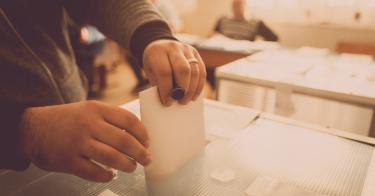Early voting — opening a limited number of locations where people can cast their ballots prior to Election Day — is a “reform” that states should reconsider. Its disadvantages seem to outweigh its benefits.
Until the 1980s, states offered Americans only two ways to vote: in person on Election Day, or with absentee ballots intended for those unable to vote in person because of disability or illness. But proponents pushed early voting as a way of increasing turnout by making voting more convenient.
Texas became the first state — almost 30 years ago — to implement the policy, which has now spread to 37 states and the District of Columbia (including three states that mail ballots to all voters).
A review by the National Conference of State Legislators shows that the early voting period ranges from as much as 45 days before an election to as little as four days. The average length is just shy of three weeks: 19 days.
The number of Americans casting their ballots early has risen steadily. In the early 1990s, only about 7 percent of voters did so. Last year, according to the U.S. Election Assistance Commission, 17.2 percent of all ballots were cast through in-person early voting and 23.7 percent through mail-in absentee ballots.
While early voting may seem more convenient, it appears to have the opposite effect of what its proponents sought: It actually decreases turnout. A number of studies, including one by American University and another by professors from the University of Wisconsin, conclude that states that have adopted early voting have lower voter turnout than states without early voting.
The 2013 University of Wisconsin study found that “early voting lowers the likelihood of turnout by three to four percentage points.” In fact, the longer the window of early voting, the greater the effect on lowering turnout. This may seem counterintuitive, but that is what the studies show.
The reason why early voting decreases turnout has not been determined conclusively. One reasonable theory is that allowing voters to vote over an extended period before Election Day diffuses mobilization efforts. Candidates and political parties spend an enormous amount of time and resources on get-out-the-vote efforts just before Election Day. If those efforts have to be spread out over several weeks, then they will not have the same intensity and may not be as effective in reminding and persuading individuals to cast ballots.
There are other problems. Voters who cast their ballots early are doing so without knowledge of events that may occur later in a campaign or just before Election Day that could be important to their choice of candidates. Last year, the early voting period started in some states before Hillary Clinton and Donald Trump had even completed their three debates.
In the 2016 presidential primaries, Sen. Marco Rubio, Florida Republican, garnered more than 70,000 votes in Arizona, even though he had dropped out of the race a week before the election. Those who had already cast their votes for him wasted their ballots. John Kasich came in fourth behind Mr. Rubio, losing by only a little over 6,000 votes, leading one CNN analyst to say that Kasich was beaten by “Rubio’s ghost.”
Finally, it seems obvious that early voting increases the already skyrocketing cost of political campaigns. When so many citizens vote early, any candidate who limits spending on voter mobilization to the last few days before Election Day (instead of engaging in expensive turnout efforts during the entire early voting period) will be at a serious disadvantage.
Early voting seems to damage the civic cohesiveness inherent in having voters throughout the nation turn out on a single day to choose our president and our legislative representatives. Given the costs, particularly its tendency to lower turnout, early voting is a “reform” that states should consider undoing.
This piece originally appeared in The Washington Times



